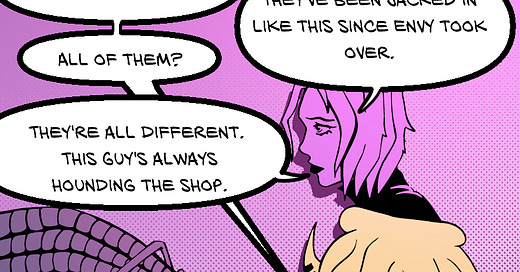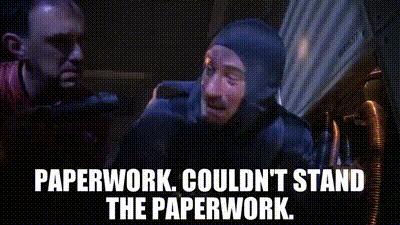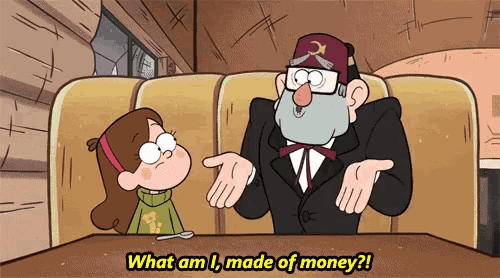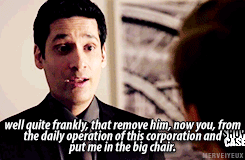Incentivized Ignorance
What does the cyberpunk genre tell us about today's political and interpersonal landscape?
Over the past several months, I have become more and more invested in cyberpunk as a genre. It is technically an aspect of Violet 9, after all. So I better know more about it. I’m invested in things that elicit an emotional response from me, and I often want that response to feel deep. It tricks me into a sense of purpose and value. Because of this, I must admit that I used to avoid science fiction. Furthermore, I harbored a generalized view that cyberpunk was high tech, with implants and supercomputers. I assumed the villains in these stories existed because they needed antagonists to tell a compelling story. I hadn’t taken the time to examine the concept of, “high tech, low life,” that the cyberpunk genre builds from.
I’m increasingly convinced that — especially in the United States — we live in a rapidly advancing cyberpunk system. We have brilliant technologies, like iPhones, that connect us on fascinating levels. We don’t need a computer shoved in our heads when we can buy one that fits in our pocket. It’s a more elegant solution. We live with a government obsessed with neoliberal ideals of favoring deregulation, capitalism, and the free market. We’ve found a way to treat everything as a product. Hobbies can be monetized, labor can be marginalized into nominal gigs, and (with the advent of social media) people are products, too. We buy our surveillance systems, and they rely more on our typed sentiments than our spoken word or images. They give us convenience and we’ll do anything for that. People are just data, and we fork over our data constantly. It’s often required just to interact with media, or to buy a coffee, and we just hit, “yes.”
If I were a religious person, I’d say we’d built a system that let evil in. I hope that my divorce from the shackles of religious dogma makes me less susceptible to believing untrue things and adhering to expressions that cause harm. What this means to me, as a blossoming fan of the cyberpunk genre, is that I need to think critically before assuming we’re indeed living in a high tech, low life situation. I need to bear some caution before throwing in the towel and assuming all hope is lost.
I’m visiting doctors more than I ever have to address my ongoing situation seven months post-heart attack. I’d love to build a path on which I could see at least another thirty years. To be honest, it’s hard not to think I’m living on borrowed time. Lately, I feel a kinship with V, the player character from the videogame Cyberpunk 2077. V is fighting against the clock of a six month prognosis after the ramifications of a deadly shot to the head and some malicious software in their cranium. I’ve made it longer than V’s expected expiration. But I don’t know if that makes it easier.
I live in Iowa, where our Senator, Joni Ernst recently told her audience at a town hall that, “we’re all going to die.” She was responding to her constituents as they drilled her with questions on her support of the One Big Beautiful Bill, which threatens to gouge Medicaid and SNAP benefits nationwide. It’ll kill untold numbers of Americans, Iowans included, by rejecting their medical care, driving up their out of pocket costs, and (where SNAP is concerned) make access to food and food support even harder.
Meanwhile, I have two stents in my arteries that are keeping me alive. I have access to incredible medicines that have made my body more likely to continue existence in the wake of my new Coronary Artery Disease. However, each little career decision Cathryn and I make involves us agonizing over insurance costs. My continued existence will cost thousands of dollars a month without coverage. We have great coverage because of Cathryn’s work situation, which feels like a pair of golden shackles, holding us in place. I have high tech solutions giving me all this extra time, while we witness the low quality of life devouring our neighbors and biting at our heels.
Shortly after her disastrous town hall, Joni Ernst issued a video apology from a cemetery. The apology rang hollow, but Joni assured us that we are, indeed, all going to die… eventually. Of course we are, Joni. We all expire at some point. But there’s no good-faith argument in which one can claim a young death is warranted if it can be avoided. Set aside your gods and faith, and take a moment to reckon with how amazing it is that we are the species we are, one that can quantify its experience and relate to others the way we do. We’ve never found evidence of anything else like us. I think we all deserve as much life as we can get. But, Joni assures us that if we all get right with Jesus, we’ll live forever.
Joni is rife with incentivized ignorance. If she supports a bill that cuts healthcare and food access for millions, who cares? She’s adherent to a faith system that assures her that our suffering in the here and now doesn’t matter. Insurance companies can lobby senators like Joni and show them what matters: deregulation, capitalism, and the free market. She can make a buck if they make a buck. Don’t forget, those sick people, those hungry people, they’re only in those situations because they’ve committed some moral failing. Especially those morally wrong enough to be in poverty.
It’s not just Joni moving through incentivized ignorance. We’re all susceptible to bullshit. Even more susceptible when we can’t afford healthcare, or nutritiously valuable food is out of reach. In these instances, we can more easily agree that, if we’re just a few steps away from needing assistance, we’ve done something wrong. When needs are out of reach we more easily cave to thinking the right tea or magic rock will get us through our ailments. We might reject medical understanding and shun taking our medication because, “the man just wants us to buy pills.”
We have the technology and understanding to keep a heart pumping longer than ever before. With good medical care, reasoned understanding, access to my doctor, access to care, and a will to take care of myself, I should be able to get those thirty years. We live in a high tech environment. But, the man does want us to buy pills forever. The problem isn’t the pills, it’s the man wanting us to buy it. If we’re the greatest country on earth, why are we so easily at risk of low life situations? Why can we not afford healthcare for all? Why can we not afford to feed all of us? I worry it's because, in our high tech, low life system, people are no more an asset than the latest iPhone. If it breaks, replace it. When the system deems it obsolete, throw it away. And, if we can sprinkle in ungrounded claims of an afterlife — claims that devalue the here and now — we can make it easier for even you, the suffering individual, to swallow that your suffering is meaningless.
Cyberpunk isn’t about hopelessness, even in a setting where everything is bleak. In Cyberpunk 2077, V’s entire motive is holding onto hope there’s a way to cure what’s killing them. The beauty in the cyberpunk genre is getting to know individuals and how they attempt to thrive in a hellscape. What keeps the oppressive systems dominant in the cyberpunk genre is that everyone is focused on the individual. Revolution is impossible if it doesn’t involve all of us. And revolution isn’t easy or painless. Our beloved characters like V, or Sam Lowry (Brazil), often fail because the oppression of the system will always flattens an individual in its way. Other times, heroes may fall to incentivized ignorance, like Matthew Kellog becoming rich off the system in Continuum. Or, like Joni Ernst, be propped up and supported for continuing to maximize profits and decimating regulations, while being certain we’ll all be better off when we’re dead.
Don’t lose hope, though. I don’t think we’re as vulnerable as them. We see it, we know not to be incentivized into the ignorance of dehumanizing our friends, family, neighbors, and selves. We need to stand up, show up, and get in the way. A revolution isn’t impossible:
It has to start somewhere, it has to start sometime
What better place than here, what better time than now?












Great read! I'm glad you are getting into the cyberpunk genre, it has a way of being very flashy and aesthetic when you are younger and much more interesting as a lens to look at the present. Reminds me of a great quote from Frank Herbert.
“The function of science fiction is not always to predict the future but sometimes to prevent it.”